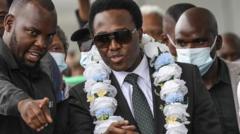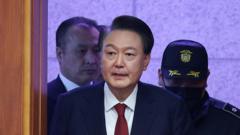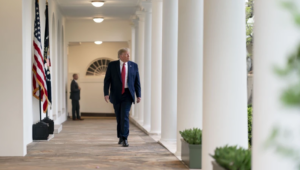As Mozambique's political landscape remains turbulent, opposition leader Venâncio Mondlane has signaled openness to working with President Daniel Chapo if certain conditions are fulfilled. This development follows contentious elections and unrest resulting in numerous casualties, sparking dialogue for potential reconciliation and reform.
Mozambique’s Opposition Leader Open to Collaboration with Rival President

Mozambique’s Opposition Leader Open to Collaboration with Rival President
Amid ongoing political tension, Venâncio Mondlane expresses willingness to join Daniel Chapo's government, given key demands are met.
Mozambique’s political scene is charged with tension as its main opposition leader, Venâncio Mondlane, expressed readiness to collaborate with rival President Daniel Chapo, contingent upon meeting several critical demands. In an interview with the BBC, Mondlane indicated that he would consider serving in Chapo’s government if the efforts to address the political crisis are earnest, especially following the contentious elections that have left the nation divided and reeling from civil unrest that claimed around 300 lives.
Chapo has assembled a team to evaluate the possibility of inviting Mondlane into an "inclusive" governmental role. Mondlane, rejecting the legitimacy of Chapo’s electoral victory, termed the vote rigged while emphasizing that he would suspend protests for the first 100 days of Chapo’s presidency, contingent upon Chapo's agreement to three specific stipulations: the unqualified release of around 5,000 detainees involved in protests against the election outcome, financial restitution for the families of those killed by police during the unrest, and free medical care for approximately 200 individuals injured in police confrontations.
Despite the backdrop of political strife, both leaders conveyed an opening for dialogue. Chapo stated his aspiration to govern inclusively, pledging reforms to ameliorate concerns about electoral laws and human rights. He noted ongoing discussions with opposition parties represented in parliament, aimed at involving diverse societal segments in governance. Chapo stressed that the qualifications of individuals considered for government roles are paramount, hinting that Mondlane's participation would hinge upon his perceived compatibility and merit.
Both leaders represent a generational shift in Mozambique politics, with Chapo, 47, representing the long-ruling Frelimo party, focusing on attracting local and foreign investment to stimulate economic growth and address youth unemployment. Mondlane, 50, who broke away from the Renamo party to run for office independently, garnered significant support from young voters during his campaign, resonating with their aspirations for change.
In this context, the potential collaboration between Mondlane and Chapo may set the stage for substantial shifts in Mozambique’s governance and political stability, amid a populace yearning for resolution and progress.




















